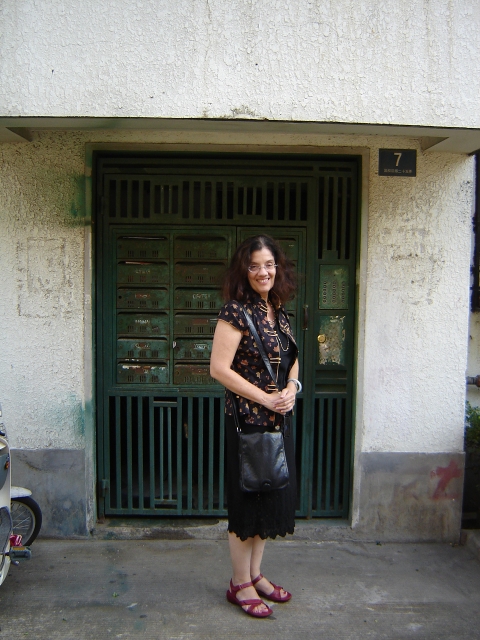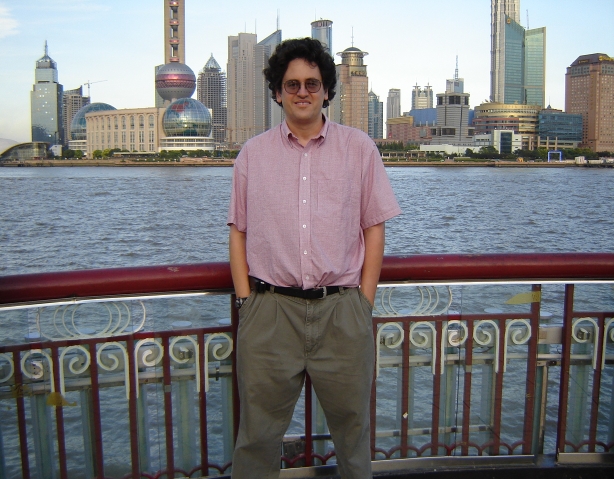
Lisa took the train back to Shanghai after a week in Beijing - an overnight ride in a sleeper car. She went up there to give a talk on divination in classical China and Greece, and meet some scholars who work on Greek texts. But she wound up giving three talks there instead of one: when word got out that she was up there, she got invited to give two more! She's coming back on December 20th. I miss her a lot.
When I first came back from China, I didn't know quite how I'd eke out a feeble existence here until she got back. Now I seem to have settled into a routine, and I'm reasonably happy most of the time. But when I look at this picture of her in front of our apartment building in Shanghai, I want to cry.

That's from our last day together in September, as we were heading out for a cruise on the harbor followed by dinner in the Bund. Here I am by the harbor:

I can cheer myself up a bit by looking at this goofy sign across from where we had dinner:

It's a great testament to how Chinese are bravely tackling the challenge of communicating in English:
Can you guess what that means?
November 5, 2006
Congressional elections in the US are whipping the media into a frenzy,
since the Democrats have a chance of retaking the House
and/or Senate. Ever since the great Bush-Gore fiasco in 2000,
I've learned to bury my hopes when it comes to US elections.
But we'll see. Various chickens may be slowly coming home to roost.
You can tell something like this is happening when arch-conservative columnist George Will writes:
Many months ago it became obvious to all but the most ideologically blinkered that America is losing the war launched to deal with a chimeric problem (an arsenal of WMD) and to achieve a delusory goal (a democracy that would inspire emulation, transforming the region).Adding its voice to this choir is the Military Times Media Group, which is again calling for the Secretary of Defense, Donald Rumsfeld, to resign.
You may wonder why I'm bothering to remind you that Rumsfeld is the Secretary of Defense. In political blogging circles this would be like reminding you that France is in Europe. But I like taking the long view. I like imagining someone reading this decades hence, someone who has blissfully forgotten the issues that now seem so important in American politics. I wonder what this future reader will think of stories like the following:
Abstract: Human-dominated marine ecosystems are experiencing accelerating loss of populations and species, with largely unknown consequences. We analyzed local experiments, long-term regional time series, and global fisheries data to test how biodiversity loss affects marine ecosystem services across temporal and spatial scales. Overall, rates of resource collapse increased and recovery potential, stability, and water quality decreased exponentially with declining diversity. Restoration of biodiversity, in contrast, increased productivity fourfold and decreased variability by 21%, on average. We conclude that marine biodiversity loss is increasingly impairing the ocean's capacity to provide food, maintain water quality, and recover from perturbations. Yet available data suggest that at this point, these trends are still reversible.
This chart illustrates the loss of species from large marine ecosystems. The curves show the percentage of fish and invertebrate taxa. that have collapsed over the past 50 years. Here "collapse" means that catches have dropped below 10% of the maximum recorded catch. The diamonds show the percentage of collapses by year; the triangles show cumulative collapses. Data are shown for all (black), species-poor (<500 species, blue), and species-rich (>500 species, red) large marine ecosystems.
The map shows the number of species in different coastal ecosystems. The South China Sea looks really diverse!
The article says that if current trends continue, all the world's fisheries will collapse by 2048. The good news is that they say it's not too late to reverse these trends! Of course, this will require drastic action... which fishermen would rather put off until it's too late, making their children rather than themselves pay the price.
Bees are in danger of a similar collapse:
Bees are responsible for pollinating 30% of American crops that depend on pollination: apples, oranges, grapes, cherries, watermelon, squash, and so on. If bees die out, new plants will take over... a major ecosystem change.
What can we do about such extinctions? It may seem not much. But life is about doing your best, sometimes in near-hopeless situations. We can learn to eat smart - US farmed catfish and tilapia aren't going extinct, for example, so they're okay, but shark and swordfish are in serious trouble, so don't eat those.
We can also be friendly to bees. Even though much of our garden died during the month-long heat wave of July 2006, there are still plenty of bees buzzing merrily amid the surviving lavender and African violet. And when I replant, I'll plant more flowers that bees like. I may not prevent extinction - but a lively garden full of birds, butterflies and bees is a beautiful thing in its own right.
(Despite reports of "killer bees" in Riverside County, I've never been stung yet. Of course, I don't go kicking bushes that might have hives in them. The bees in my garden seem completely uninterested in anything but collecting nectar.)
The bees must be doing their job: the citrus trees in our side yard are heavy with fruit. I ate my first homegrown tangerines for breakfast today - four of them! The blood orange tree is almost toppling over, it's so heavy with fruit:

The oranges aren't ripe yet, though.
November 6, 2006
Some interesting email from Tony Smith:
Here are a couple of quotes from http://www.debka.com/ (I know it is close to Israeli intelligence, and that some details may be tactical disinformation, but overall it seems to be reliable.): "... November 1, 2006 ... the USS Eisenhower is at sea off the Saudi Arabian coast, together with another aircraft carrier, the USS Enterprise. ... there are now three US aircraft carriers in the Persion Gulf and surrounding waters, including the USS Iwo Jima ... a fourth US aircraft carrier, the USS Boxer, will arrive on the scene together with its carrier strike group ...". "... November 5, 2006 ... scores of surface missiles - a record for any war games anywhere - were tested simultaneously at a desert testing site some two hours drive from Tehran Thursday, Nov. 2. ... A senior American missile expert told DEBKAfile that the Iranians demonstrated up-to-date missile-launching technology which the West had not known them to possess. They also displayed unfamiliar warheads. But their most startling feat was the successful first test-fire of the long-range Shehab-3 with its cluster of tens of small bomblets ... The entire range bore the imprint of new purchases from China. This Shehab-3, whose 2,000-km range brings Israel, the Middle East and Europe within reach - may be more than a match for any anti-missile missile system in American, Israeli or European arsenals ...". If the huge firepower of FOUR carrier groups is used against Iran (and its nuclear installations) and if Iran has been given really bad missiles by China and Russia, then I am not sure what will be the outcome. Anyhow, I don't think that the USA can maintain all four carrier groups on station in the Persian Gulf region for more than a few months, so whatever is going to happen (either merely show force and then go home (probably pointless) or attack and see what happens (maybe uncertain outcome)) will probably happen in the near future. Tony
I'm also glad to see Rumsfeld gone.
November 15, 2006
Very busy advising my grad students these days, with Jeffrey Morton and Derek Wise finishing up and looking for jobs. Running around a lot too. Last weekend I gave a talk on the beauty of the dodecahedron at Dartmouth. This weekend I was invited by Jorge Pullin to Louisiana State University, where I'll talk about higher gauge theory and see the LIGO installation in Livingston. I've been wanting to see this for a long time!

I'll try to take some pictures.
I have time to have fun and think about things, but not time to
also write about it here!
November 19, 2006
You can see pictures of my tour of LIGO in
week241 of This Week's Finds.

Dear Mr Baez,Here's my reply:Having just read Al Gore's book-of-the-film "An inconvenient Truth" (Dutch+Translation), and having read your webpage on mass extinction, I cannot resist putting you to a small test by asking you the following questions:
Sincerely yours,
- Do you own a car?
- If you own a car, do you use it for pleasure in your sparetime?
- Do you use your own car or a rented car when you go on holiday?
- Do you travel by plane when you go on holiday?
- How many faraway conferences should an academic visit per year, given the fact that this pollutes the globe, uses natural resources and indirectly destroys natural habitat? (Those tarmac runways have to be located somewhere). How much could be done via the internet?
- Do you have more than two children?
Willem Koster, Netherlands
I think it's important not to get on a moral high horse about ones virtuous lifestyle, but it's worthwhile striving to be good in all respects. So, I don't think it's nice to send people emails quizzing them about how good they are - but it's nice to get such emails.
- Do you own a car?
Yes, one of the most efficient ones available when I bought it: a Honda Civic. It's over 10 years old, so it's almost time to buy a new one. Luckily, this can even more efficient.
- If you own a car, do you use it for pleasure in your sparetime?
Hardly ever.
More importantly, I'm lucky enough to be able to walk to work.
- Do you use your own car or a rented car when you go on holiday?
No.
- Do you travel by plane when you go on holiday?
This is my main sin along these lines. I hardly ever "go on holiday", but I travel by plane when people invite me to give talks, and then sometimes I stay somewhere and have fun. It's not the "fun" that's the problem, of course - it's my fairly heavy usage of planes.
But, just last week, I learned a way to lessen this problem:
- Carbon Neutral, Neutralize your travel!
- How many faraway conferences should an acedemic visit per year, given+the fact that this pollutes the globe, uses natural resources and indirectly destroys natural habitat?
I don't know how to determine a specific number.
- How much could be done via the internet?
Much more. And, much more will as time passes. The last big loop quantum gravity conference was done over the internet, and that will become a better and better option as telepresence technology improves.
- Do you have more than two children?
No, none.
How about you?
Best,
jb
Academics tend to think lots of plane travel to conferences is an essential part of scholarship, but it's not. What's essential is communication.
It's true you can't have cocktails and after-dinner interaction online - yet. But, it's easy to imagine how! World-wide chains of virtual reality restaurants and café, with special rooms for conferences, are already doable with present-day technology. There's just not the demand yet. Why not? Mainly because nobody is providing this service at an affordable price! And why not? Well, mainly because there's not the demand. It's one of those chicken-and-egg things that seems intractable until one day we reach the tipping point and suddenly things change.
I think that for at least another decade or two the price of transporting bits will continue to drop, and the price of transporting kilograms will continue to rise. Given this, we can expect the trend towards telepresence to continue. And as it does, things that seem futuristic suddenly become commonplace. When phone calls became free, people started dating people in other countries via video. So, the idea that conferences require physical presence is starting to seem old-fashioned, and someday we may wonder why we ever thought that. We may just have conferences in the Grid.
You Can Date Now, Meet Later
Los Angeles Times
Alana Semuels
October 12, 2006
It started as so many relationships do - the long phone calls, the movie dates, the tentative introductions to family and friends.
But the courtship of Mark Passerby and Salwa Al-Saban was hardly ordinary. The two were separated by the Atlantic Ocean, a time difference of six hours and vast cultural contrasts. He lived in Lansing, Mich., she in Cairo.
They say they fell in love over Skype, a service that allows people to call each other for free over the Internet.
In November 2005, one month after they first "clicked" online, they were married.
"Everyone around us thinks we're crazy," said Salwa, a 25-year-old doctor who just moved to Lansing and took her new husband's name. "But it is much more perfect than anything I could have ever wanted."
Software like Skype is creating a world of online dating that enables relationships between people who live all over the globe, some of whom may never meet in person. By allowing free phone calls between those who share a common language and a high-speed Internet hookup, Skype has spawned love connections between Belgians and Japanese, Germans and Israelis, Americans and Egyptians and even a Guatemalan nail technician and a Canadian member of the Raelians, a group that advocates human cloning.
The software routes calls over the data network, substituting voice for e-mail. Web mail services such as Google, MSN and Yahoo also allow customers to make Net phone calls, but Skype has kept a few steps ahead of its competitors by being one of the first to offer this for free. Skype also lets users put money in an account and call land-line phones and cellphones.
Since it was founded in 2003, Skype has added features such as voice mail and video communication. The service says it has more than 100 million users.
At first, Skype was used mostly by people who already knew each other: spouses on business trips, camp friends and college students. Then specialized dating websites discovered Skype, and its role as a matchmaker started growing.
Singles send messages to one another on most online dating sites, but "it takes an awful long time for them to find out if they're compatible," said David Finlay, co-owner of someonenew.com, a 14,000-member dating site. Finlay says that by using Skype, people on his website are able to determine whether they're compatible after one or two phone calls.
"The natural thing to do is to talk to one another, not to type," he said. "It's a little bit of nostalgia here - we're actually speaking to each other again."
Salwa, the Egyptian doctor, said, "You can hear the laughter, the way the person talks - if he's tired, depressed. It really is much better than e-mail."
After discussing their shared interests online (exploring caves, crying during romantic movies, pop music), Salwa and Mark began to operate on the same sleep schedule. Mark, a 41-year-old technology developer for real estate company Re/Max, set up a movie projector and trained his Web camera on it so they could watch movies together.
He bought a ticket to Egypt to meet Salwa, and they were married on his first trip after they convinced her conservative family that this American who had shown up out of the blue was a suitable match for her.
After a while Meenakshi's wind-surfing instructor Paul showed up, and we had dinner. Paul is the kind of guy who lives life one day at a time, so we wound up listening to some great stories. Like the time a golden eagle spiraled up past him. Or the time he sailed up into a raincloud so high he found himself amid snowflakes. Or best of all, the time he caught a powerful updraft at the boundary of some big air masses, sailed down the coast towards San Diego at a height of about 1500 feet, drifted out to sea, and saw a whale surface, spout and dive back under! Then he got scared, sailed back to the shore, and looped back around to his original starting point - where there was now no wind at all.
I spent the night there, and today I went on a longish walk with Chris. We went north towards Marina del Rey. We saw a bunch of gulls, pelicans, cormorants, sanderlings, terns, blue herons, an egret - and a lot of other birds whose names I forget. Chris knows birds pretty well.
Their apartment overlooks the Pacific Ocean. This morning, Chris said he saw two swans fly by! Very unusual. This motivated me to put up the following puzzles:
If you get stuck, try puzzle 32
and puzzle 33 from my puzzle
collection.
November 25, 2006
News flash: mice don't like cheese. They prefer fruit, or
other foods with high sugar content.
My notoriety has reached a new high: I'm featured in the clue for 41 down in the November 22nd crossword puzzle at the A. V. Club, written by Tyler Hyman. I'm not sure what the A. V. Club is, but it's somehow associated to the joke newspaper The Onion, which is occasionally quite funny.
(In case the crossword puzzle disappears and my five minutes of fame end before you read this, the clue is "Folk singer with a mathematical physicists cousin".)
I had a huge amount of fun today figuring out stuff about
the "fool's golden ratio", which I added to "week241". There are some beautiful,
easy connections between Fibonacci numbers, crystals of fool's gold,
and the golden ratio - great fodder for silly puns.
November 27, 2006
It rained today!
This may not seem like a big deal to you, but out here in the chaparral it's a big deal. It hadn't rained since Spring. In July, it went over 37° Celsius (100° F) every day! This was the hottest November on record, with temperatures often surpassing 32° Celsius (90° F). So, it's pretty parched here.
But, last night it
got downright chilly, and in the morning I heard the tap-tap-tap of...
rain on my roof. It's a blessing, a relief, a delight.
November 28, 2006
There's an interesting argument going on about programs that seek to
let you make your lifestyle "carbon neutral" by paying for
offsetting measures. George Monbiot thinks the benefits of such
programs are hard to evaluate, and merely encourage
complacency:
As for whether the existing offset programs live up to their claims, I'll need to learn more to have an informed opinion. But, as Morton points out, it must be possible to design some program like this that actually works.
I had a good conversation with James Dolan this evening in a little café near my house - one I'd never been to before! Together with Todd Trimble we're trying to categorify quantum groups. We're about "half done", insofar as a quantum group can be chopped roughly into two overlapping "halves". There's a wealth of beautiful combinatorics and category theory here.
© 2006 John Baez
baez@math.removethis.ucr.andthis.edu